It’s perfectly reasonable to be hesitant about undergoing any sort of dental procedure. But we want you to know that our team at Smile Design Implant Centers will do everything we can to ensure the smoothest possible experience for you, no matter what sort of dental work you’re receiving! As soon as we begin planning your treatment, we’ll make sure you’re fully informed about everything you’ll need to do both before and after to ensure success. Of course, if you have any other questions about your upcoming appointment, or simply need some further advice about how to navigate the pre-op and post-op time periods, give us a call!
Pre-Op Instructions
At Smile Design Implant Centers, we want to do everything possible to ensure that you have a comfortable and safe experience in our Reno dental office. Please review the following pre-operative guidelines prior to the day of your scheduled surgery appointment. If you have any questions regarding your surgery or these guidelines, please call our office.
- Please do not have anything to eat or drink for 8 hours prior to surgery if anesthesia is used. Surgery appointments will be rescheduled if these instructions are not properly followed.
- If you are taking prescription medications for other medical reasons, these may be taken at their normal times with small sips of water.
- If you are prescribed a rescue inhaler for asthma, please bring this with you on the day of your surgery.
- When you have general anesthesia, a responsible adult over the age of 18 must accompany you to the office, remain in the office during the procedure, and drive you home. This person should also be able to stay with you for several hours once you return home after surgery.
- Please do not wear lipstick, contact lenses, facial jewelry of any kind, or high-heeled shoes to your appointment. Please tie your hair back away from your face. Please wear a short-sleeved shirt or blouse. Please remove all dark fingernail polish for our monitoring equipment.
- Plan to rest for the remainder of the surgery day. The patient should not drive a vehicle or operate any machinery for 24 hours following anesthesia.
- If you develop lung or nasal congestion, the flu, a cold, or a fever, please advise us a few days before your surgery.
- The use of alcohol or recreational drugs can have an adverse effect on the anesthesia medications that we use. Please discontinue the use of such for at least 72 hours prior to your procedure.
- Ideally, stop smoking 24 hours prior to surgery.
- Women, please note: Some antibiotics may interfere with the effectiveness of your birth control pills. Please check with your pharmacist.
Post-Op Instructions
For the remainder of the day:
- Do not spit. Use a tissue to wipe your mouth as needed or swallow your saliva.
- Do not use a straw. Drink straight from the cup.
- Do not smoke.
- Keep fingers and tongue away from the surgical area.
- Spitting, using a straw, smoking, and poking the surgical area can dislodge the blood clot that is forming and will cause bleeding from the site. Also, smoking can increase the chances of an infection.
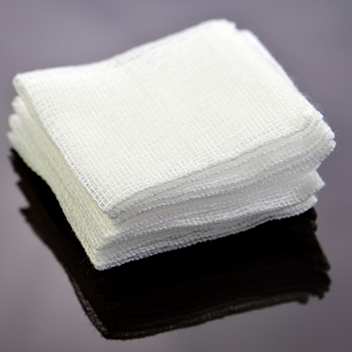
Bleeding
- Some minor bleeding is expected after dental implant surgery. It will usually subside quickly and stop within an hour or two after surgery. A little oozing is normal and may persist for several hours.
- Keep gauze on the surgical area with some biting pressure for 30–45 minutes.
- If all else fails, call the office.

Swelling
Most patients will experience some swelling after surgery in the mouth. It may be mild or severe and is different for every patient. The swelling may increase for the first 24–48 hours before it starts to go away. It may last for several days. Some bruising may also develop on the face.

Diet
- You may start with non-abrasive foods such as mashed potatoes, pasta, cottage cheese, soup, or scrambled eggs as soon as the local anesthetic wears off.
- You may resume a regular diet as soon as you feel up to it; however, please try not to chew directly on the implant sites.

Oral Hygiene
You may start rinsing tomorrow, very gently, with some warm salt water (1 tsp of salt in 8 ounces of warm water). You may brush your teeth as usual, though be very careful near the surgical sites.
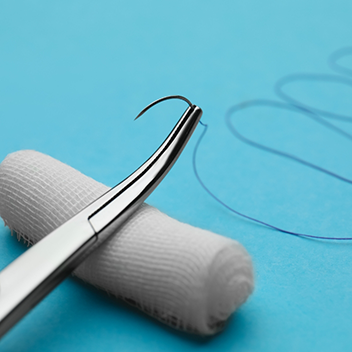
Sutures
Unless told otherwise, the sutures used during your procedure are dissolvable and will fall out on their own. This generally occurs in the first week after surgery, but timing varies from 4–10 days.
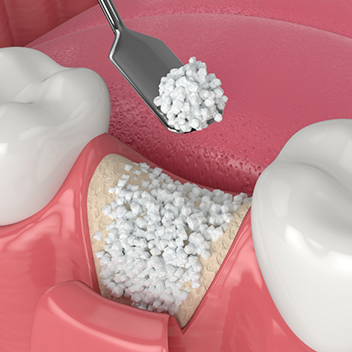
Bone Graft Material
If your surgeon placed bone graft material at the time the dental implant was placed, you might notice some gritty material in your mouth. This is nothing to worry about and should subside within a day or two.

Will I Be Able to See My Dental Implant?
Depending on the location and stability of the implant being placed, your surgeon may opt to bury the implant under the gum tissue. In time, you will return and have the implant uncovered so it can be restored.
If stability is optimal, the second stage procedure can be bypassed, and an attachment is placed that protrudes through the gum tissue, which will be visible. Once the bone has healed, the restoring dentist will be able to access the implant without the need for further surgery.
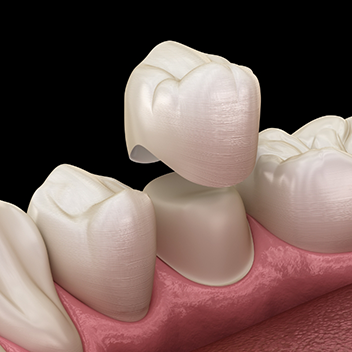
Where Can the Crown Be Placed?
A dental crown can be attached to a dental implant once the implant has fused to the bone. This is a process called osseointegration.
The length of time the bone must heal varies from case to case and will be discussed with your surgeon. The length of time needed for osseointegration is a function of the bone quality, quantity, and implant stability at the time of placement.
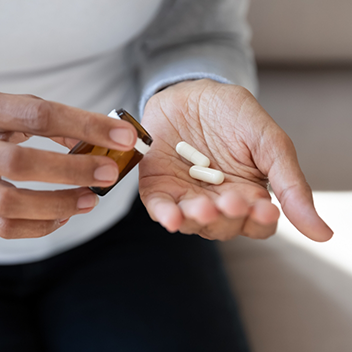
Medications
You were probably given one or more prescriptions for medications. Take all as directed on the bottle. Call us if you experience severe nausea or diarrhea or cannot swallow your pills.
- Antibiotics: Continue until the bottle is empty. Do not quit halfway.
- Pain Medicine: Usually, it is necessary to take narcotic pain medication in a scheduled fashion (every 4–6 hours) for the first 24 hours and as needed thereafter. Remember that narcotics can make you drowsy, so no driving, swimming, operating machinery, or drinking alcoholic beverages while you are taking them.
- You may wean yourself off the narcotic medication and substitute 500 mg of acetaminophen (Tylenol®).
- If directed to do so, you may use ibuprofen, 600 mg, every 6 hours while awake, for the first 4 or 5 days.

Activity
Once you are no longer taking narcotic pain medication, you may resume your normal activities as you feel up to it. Go easy at first with exercise and recreation and increase your activity slowly over several days back to your regular routine.
Please follow these instructions as closely as possible. They are designed to help you heal quickly and comfortably.
Questions?
If you have a question about your procedure or treatment plan, or if you would like to speak to your surgeon, please contact us at any time.
During business hours, please call our office. After hours, please contact our office, and our answering service will page a surgeon. We’ll get back to you as soon as possible.
Learning with Dr. Field
Want to learn more about all things related to dentistry? Watch Dr. Field in our featured educational videos where he provides a wealth of information for your benefit!







